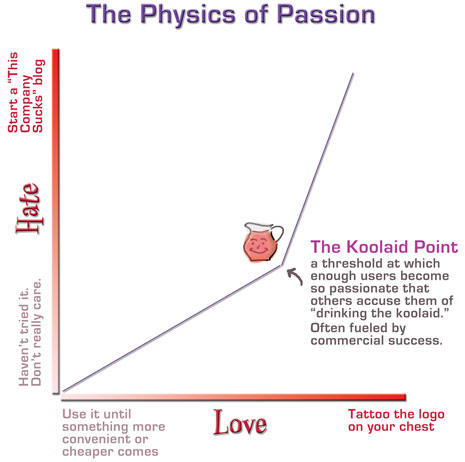The Koolaid Point
Confirmed 37,989
| Navigation |
| About • Origin • Spread • Search Interest • External References • Recent Images |
About
The Kool-aid Point is a term coined by American programming instructor and video game developer Kathy Sierra to describe a hypothetical threshold point at which the public perception of a widely recognized brand or public figure becomes unfavorable due to its sheer popularity, rather than as a result of valid criticism against it.
Origin
The phrase was first used by Kathy Sierra, an American developer known for educating Javascript-based technologies and authoring a series of training manuals for programmers, in an article she posted to her Wordpress blog on August 10th, 2005. Titled "Physics of Passion: The Koolaid Point," the article postulated that during the rapid growth phase of an up-and-coming brand, there is a threshold point at which the consumer opinions about the said brand takes a negative turn largely due to its overwhelming commercial success. The concept, which stems from the well-known American-English colloquialism "drinking the Kool-Aid,"[10] can be seen as a parallel theory to another sociological concept known as the Tipping Point[10], which refers to the threshold at which the public at large widely adopts a previously little-known practice over a drastically short period of time.

It is physically impossible to have everyone love what you do. And the more people do love it, the more likely it is that you'll have an equal and opposite negative reaction. X = -Y the physics of passion.
Spread
On August 12th, 2005, Sierra's "Kool-aid Point" theory was highlighted by brand marketing consultant John Moore on his blog Brand Autopsy. In October 2005, the "Kool-Aid Point" was featured by Wired in its Jargon Watch column.
On October 7th, 2014, Sierra wrote a blog post titled Trouble at the Koolaid Point on her website Serious Pony[1], detailing her personal history of encounters with internet trolls, including the widely publicized episode of online harassments and death threats she had received in March 2007, during which Sierra's Social Security number and home address were doxxed by notorious hacker-slash-troll Weev[11] and prompted her to cancel her appearance at the O'Reilly ETech conference in San Diego, California that same month. Sierra's follow-up blog post also examined the case of GamerGate in the context of her theory and the many obstacles faced by female professionals in the tech world.
On October 8th 2014, Wired ran Sierra's article under the headline Why the Trolls Will Always Win[3]. On the following day, the story was picked by The Guardian[4] in an article by Jess Zimmerman in the context of Gamergate, which was subsequently linked on news aggregator sites like Metafilter[6] and /r/gamerghazi[7] on Reddit.
Search Interest
[search interest data not yet available]
External References
[1] Serious Pony – Trouble at the Koolaid Point
[2] Wikipedia – Kathy Sierra's Harassment
[3] Wired – Why the Trolls Will Always Win
[4] The Guardian – The truth about trolls and the men they worship
[5] Head Rush – Physics of Passion: The Koolaid Point
[6] Metafilter – Trouble at the Koolaid Point
[7] Reddit – Gamerghazi
[8] BrandAutopsy – The Kool-Aid Point
[9] Wired – Jargon Watch / Issue 13.10 / October 2005
[10] Wikipedia – Tipping Point
[11] New York Times – The Trolls Among Us
[12] BBC News – Blog Death Threats Spark Debate
Recent Videos
There are no videos currently available.



Comments ( 80 )
Sorry, but you must activate your account to post a comment.
Please check your email for your activation code.